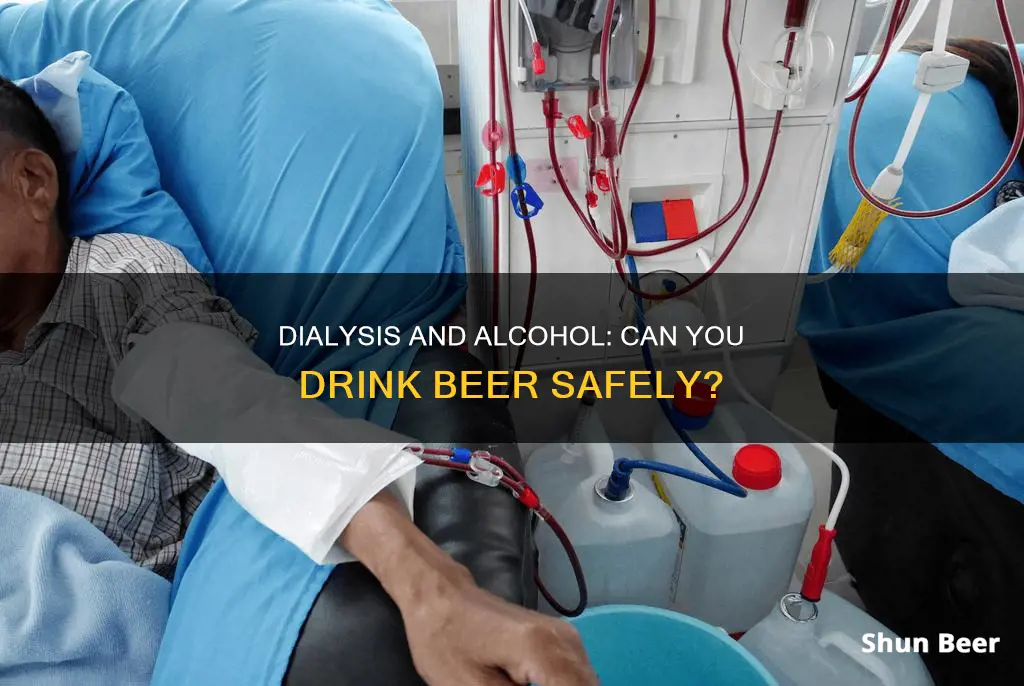
Whether or not you can drink beer on dialysis depends on a number of factors, including your overall health, medications, and diet. Beer contains phosphorus, which is limited in the diets of people on dialysis. However, some people on dialysis may be able to include alcohol in moderation, provided they do not exceed their fluid allowance and take their medications into account. It is important to consult with a doctor or dietitian to determine what is safe for you.
| Characteristics | Values |
|---|---|
| Possibility of drinking beer on dialysis | Beer contains phosphorus, so it is usually on the list of drinks to avoid. However, it may be possible to include it in moderation after consulting with a nephrologist or dietitian. |
| Fluid restrictions | Dialysis patients are recommended to limit their fluid intake to protect their overall health. A typical fluid limit is 32 ounces per day, so drinking a 12-ounce beer would leave 20 ounces for the rest of the day. |
| Potassium and phosphorus considerations | Beer contains potassium and phosphorus. Dialysis patients should limit beer to a 12-ounce serving to manage these nutrient intakes. |
| Blood sugar considerations | For people with diabetes, drinking alcohol on an empty stomach can cause blood sugar levels to drop. It is recommended to drink with food and be mindful of mixers that are high in sugar and carbohydrates. |
| Medication interactions | Some medications may interact with alcohol and affect their effectiveness. It is important to consult with a healthcare provider to ensure alcohol consumption is safe. |
What You'll Learn

Alcohol intake and kidney health
Excessive alcohol consumption can have detrimental effects on kidney health. Drinking alcohol in moderation is generally safe for healthy individuals and those with chronic kidney disease (CKD) who are not on dialysis. However, for individuals on dialysis, the consumption of alcohol requires careful consideration and consultation with a nephrologist or dietitian. Here is an overview of the impact of alcohol intake on kidney health:
Impact of Alcohol on Kidney Function:
- Filtering Harmful Substances: Your kidneys are responsible for filtering harmful substances from your blood, including alcohol. Excessive alcohol consumption can alter the function of the kidneys, reducing their ability to effectively filter your blood.
- Fluid Regulation: Alcohol affects the kidneys' ability to maintain proper fluid balance in the body. Alcohol has a dehydrating effect, which can impact the normal function of cells and organs, including the kidneys.
- Blood Pressure: Heavy drinking can increase the risk of high blood pressure, which is a common cause of kidney disease. More than two drinks per day can elevate the chances of developing high blood pressure.
- Liver Disease: Chronic alcohol consumption can lead to liver disease, which in turn adds to the workload of the kidneys. Liver disease impairs the delicate balance of blood flow to the kidneys, affecting their filtering capability.
- Acute Kidney Injury: Binge drinking, or consuming excessive alcohol within a short period, can cause a sudden drop in kidney function known as acute kidney injury. While this condition usually resolves over time, it can sometimes lead to permanent kidney damage.
- Medication Interactions: Alcohol may interact with certain medications, including those for high blood pressure, affecting their effectiveness. It is crucial to consult a healthcare provider to understand the potential interactions with any prescribed or over-the-counter medications.
Guidelines for Alcohol Consumption:
- Moderation is Key: Drinking in moderation is generally recommended for maintaining kidney health. This typically means no more than one to two drinks per day for men and one drink per day for women and individuals over 65.
- Diabetes Considerations: For individuals with diabetes and CKD, alcohol consumption should be approached with caution. It is important to monitor blood sugar levels and ensure they are under control before consuming alcohol. Drinking on an empty stomach can cause blood sugar levels to drop.
- Fluid Awareness: For individuals on dialysis, alcohol consumption must be considered within their normal fluid allowance. One 12-ounce can of beer contributes to the daily fluid intake limit, which is typically 32 ounces for patients on dialysis.
- Mixers and Nutrients: Be mindful of the ingredients and nutrient content of your beverages. Some drinks may contain high levels of sugar and carbohydrates, affecting blood sugar levels. Choose mixers that are low in potassium and phosphorus, such as club soda, diet soda, or water.
- Safe Drinking Guidelines: It is important to consult with a healthcare provider to determine if it is safe for you to consume alcohol, especially if you have a medical condition or take medications that may interact with alcohol. Individual factors, such as age, weight, liver function, and gender, can also influence how your body processes alcohol.
Beer and Motrin: Safe Mix or Health Risk?
You may want to see also

Dialysis and fluid intake
Dialysis works to remove excess fluid from the blood, so it's important to manage your fluid intake. Fluids are typically limited on a dialysis diet, and the exact amount you should have each day depends on your health and the type of dialysis you're on. People on home dialysis may have fewer dialysis fluid restrictions, while people on in-centre haemodialysis generally have greater limitations to their fluid intake.
Dialysis gets rid of excess fluid and waste in the body, but it's not as effective as healthy kidneys, which work 24 hours a day, seven days a week. Most people on haemodialysis get treatments three times a week for three or more hours at a time. This means that, in the days between treatments, your body holds on to excess fluid and waste that your kidneys cannot remove.
Going over your recommended fluid allowance can cause swelling and increase your blood pressure, making your heart work harder. Too much fluid can build up in the lungs, making it difficult to breathe. It can also lead to high blood pressure, which can cause a stroke.
If you're on haemodialysis, your weight is recorded before and after your dialysis session, and these weight changes are used to determine how much fluid to remove during dialysis. If you're on peritoneal dialysis (PD), your weight is recorded every day, and sudden weight gain may mean you are drinking too much fluid.
For dialysis patients, the complications of excess fluid include a sudden drop in blood pressure, shortness of breath, and heart problems, which can include a fast pulse, weakened heart muscles, and an enlarged heart.
If you want to begin an exercise programme, let your doctor and healthcare team know, as exercise may change your fluid requirements, especially if you are exercising and perspiring heavily.
- Eat a piece of cold or frozen fruit, like grapes, strawberries, or blueberries.
- Freeze your favourite beverage in a bottle and sip as the fluid melts.
- Suck on a piece of sugar-free hard candy or chew sugar-free gum.
- Drink from small cups or glasses.
- Rinse your mouth with mouthwash.
- Avoid "fluid traps", situations where you may drink out of boredom or habit.
- Count to 100 and try to wait for a fluid craving to pass.
- Stay cool during hotter months with a misting fan and proper clothing.
Pregnancy and Alcohol-Free Beer: Is It Safe?
You may want to see also

Alcohol and diabetes
People with diabetes drink about half as much as other adults. This may be because their doctors have advised them against drinking, or because they have other health conditions that are incompatible with alcohol. It could also be due to concerns about calories and carbs.
The occasional cocktail or glass of wine is not necessarily bad. Moderate drinking (one drink a day for women and up to two per day for men) can improve blood glucose management and insulin sensitivity. However, drinking more than three drinks daily can lead to higher blood glucose and A1C levels.
The biggest concern is hypoglycemia (low blood glucose). When drinking alcohol is combined with diabetes medications, especially insulin and sulfonylureas, low blood glucose can result. It is safer to drink alcohol with food than on an empty stomach.
Unlike protein, fat, or carbohydrates, alcohol does not require insulin to provide energy to the body. Wine and spirits are practically carbohydrate-free, with only a trace of carbohydrates in spirits and around four grams of carbs in a five-ounce glass of wine. However, sweet dessert wines contain 14 grams of carbs in a three-and-a-half-ounce glass.
Alcohol has calories, and drinking can make you lose track of what you're eating, so calories and weight can add up quickly. It can also be easy to mix up your medications or forget to take them.
There is no universal rule for drinking safely with diabetes. Talk to your doctor about your drinking habits, and they can provide tips and tricks for drinking in a way that works for you.
Beer and Melatonin: A Safe Mix?
You may want to see also

Safe levels of drinking
Drinking alcohol can harm the kidneys, leading to high blood pressure, dehydration, and liver disease. It can also worsen kidney disease. However, drinking in moderation is generally safe and may be allowable for people on dialysis, but it must be counted within your normal fluid allowance and diet, and medications must be taken into consideration.
The federal government's Dietary Guidelines for Americans defines moderate drinking as:
- One drink per day for women and older people
- Two drinks per day for men
The limits are different for men and women because men usually weigh more and alcohol is processed differently by the sexes. Women tend to have a stronger reaction to alcohol because they have less water in their bodies, so the alcohol becomes more concentrated. The risk for alcohol-related diseases is also higher in women than in men.
One drink is defined as:
- 12 ounces of beer or wine cooler
- 1.5 ounces of 80-proof distilled spirits (e.g. whiskey, bourbon, scotch, vodka, gin, tequila, rum)
It is important to note that even if drinking is allowable, it should be done in moderation and with the guidance of a doctor or dietitian. People with diabetes should also be cautious and ensure their blood sugar levels are under control before drinking. Alcohol on an empty stomach can cause blood sugar levels to drop in those with diabetes.
Beer After Laparoscopic Gastrectomy: What You Should Know
You may want to see also

Alcohol and medication
Medication Interactions
Some medications may interact with alcohol, causing them to be less effective or impacting their ability to work properly. It is crucial to check with a doctor or pharmacist to understand how alcohol may affect the specific medications you are taking. This review process is essential to ensure your medication regimen remains safe and effective.
Blood Pressure Medication
Alcohol can negatively impact blood pressure. Excessive alcohol consumption can lead to high blood pressure, and it can also interfere with the effectiveness of medications designed to lower it. As high blood pressure is a common cause of kidney disease, it is vital to be mindful of alcohol's impact on blood pressure and the potential consequences for kidney function.
Diabetes Medication
For individuals with diabetes, alcohol consumption can cause blood sugar levels to drop, especially when consumed on an empty stomach. Therefore, it is crucial to monitor blood sugar levels and ensure they are under control before considering drinking alcohol. Additionally, certain mixers in cocktails may contain carbohydrates, which can further impact blood sugar levels.
Fluid Intake
Dialysis patients need to manage their fluid intake carefully. Alcoholic beverages contribute to the daily fluid allowance, and overconsumption can lead to fluid overload, which is harmful to the heart. A typical fluid limit for dialysis patients is 32 ounces per day, and a single can of beer contain 12 ounces of fluid. Therefore, drinking a single beer would significantly reduce the allowable fluid intake for the rest of the day.
Potassium and Phosphorus
Dialysis patients need to be mindful of the potassium and phosphorus content in their diet. Beer and wine contain these minerals, and excessive consumption can lead to negative health consequences. It is recommended that dialysis patients limit beer intake to 12 ounces and wine to 5 ounces to manage their mineral intake effectively.
In conclusion, while alcohol consumption may be allowable for dialysis patients, it must be done in strict moderation and with careful consideration of medication interactions, fluid intake, and mineral content. It is essential to work closely with your healthcare team, including your doctor, nephrologist, and dietitian, to determine what is safe and appropriate for your individual needs and medical history.
Beer and Meloxicam: Safe or Not?
You may want to see also
Frequently asked questions
It depends. If you're on dialysis, drinking alcohol may be allowable, but it must be counted within your normal fluid allowance and diet, and medications must be taken into consideration. It is recommended that you talk to your doctor or dietitian before you drink any alcohol.
If you are on dialysis, limiting your fluid intake is recommended for your overall health. A typical fluid limit for patients on dialysis is 32 ounces of fluid per day. Beer contains 12 ounces of fluid per can, so drinking a single beer would leave you with 20 ounces of fluid for the whole day.
Drinking alcohol can harm the kidneys, leading to high blood pressure, dehydration, and liver disease. It can also worsen kidney disease. Some medications may also interact with alcohol and cause them not to work properly.







